Articles
Bridging Inductive and Deductive Reasoning in Sports Science
The sports science literature is rich in models designed to explain and predict physical performance. These models are built around two main approaches: the inductive approach, which starts from data to formulate theories, and the deductive approach, which starts from theories to test predictions.
In this article, we show why and how these two approaches should be used in a complementary way. We propose a framework for evaluating models based on two essential criteria: predictive accuracy and representativeness. We explain how balancing these two dimensions determines a model’s scientific value: its ability to explain, generalize, and guide practical applications.
Finally, we present concrete recommendations for future research: improving transparency about model characteristics and limitations, integrating the principle of falsifiability, and fostering interdisciplinary dialogue to develop more complete and robust models.
This is also my first publication in the philosophy of science. I contributed my theoretical expertise, the result of many years of reading and reflection in this field. I am proud that this work acknowledges and values these skills, putting them to use in advancing methodological thinking in sports science.
To cite this article (APA) : Briand, J., Mangin, T., Tremblay, J., & Pageaux, B. (2025). Bridging Inductive and Deductive Reasoning : A Proposal to Enhance the Evaluation and Development of Models in Sports and Exercise Science. Sports Medicine. https://doi.org/10.1007/s40279-025-02289-0

It Is Time to Stop Using the Terminology "Passive" Fatigue
The literature on fatigue is extensive and includes numerous overlapping, interwoven, and intersecting concepts. The term "passive" fatigue, often contrasted with "active" fatigue, is one such concept.
In this article, we discuss the concept of "passive" fatigue, explaining why this term is semantically incorrect. Indeed, participants performing tasks intended to induce "passive" fatigue remain active throughout the task, as they are required to respond to stimuli, even if these stimuli are infrequent.
In the second section, we examine how the effects attributed to "passive" fatigue (performance decline) can be better explained by the concepts of boredom and sleepiness.
In the final section, we offer several recommendations for future research. Specifically, given that cognitive fatigue, boredom, and sleepiness produce similar effects, we recommend systematically measuring these phenomena using well-defined, robust definitions.
To cite this article (APA) : Mangin, T., & Pageaux, B. (2025). It is time to stop using the terminology “passive” fatigue. Motivation Science, 11(1), 125‑132. https://doi.org/10.1037/mot0000375
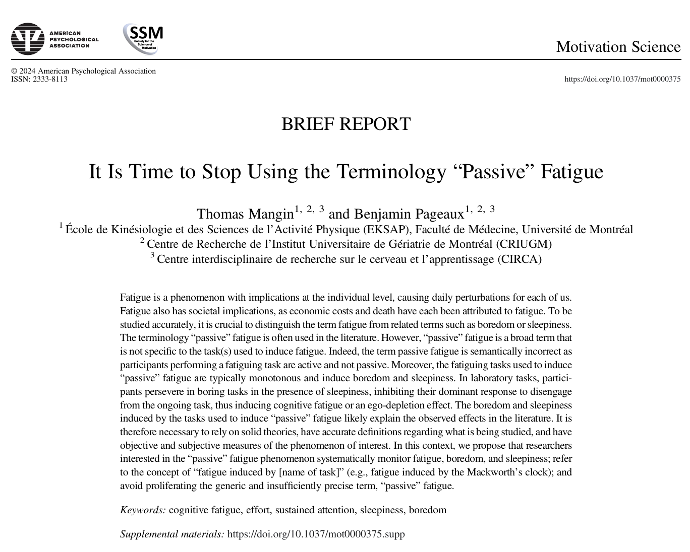
Theoretical and methodological reflections on the concept of cognitive fatigue
In this article, we have focused on the concept of cognitive fatigue, also known as mental fatigue. After providing a definition, we have placed it in perspective with other similar concepts such as physical fatigue, central fatigue, and ego depletion. We have also addressed confounding variables commonly present in the literature.
In a second part, we examined various theories that attempt to explain cognitive fatigue, such as resource depletion, synaptic mechanisms, motivational orientation, and effort investment. We particularly discussed the possible synergy between these different explanations.
We also addressed the methodologies used to study cognitive fatigue and the confounding variables that need to be controlled. Finally, we discussed the perspectives for future research, including ways to combat acute cognitive fatigue and pathologies that can exacerbate it.
To cite this article :
Mangin, T., Audiffren, M., & André, N. (2023). Réflexions théoriques et méthodologiques autour du concept de fatigue cognitive. Movement & Sport Sciences-Science & Motricité.
Link to HAL, free access of the article
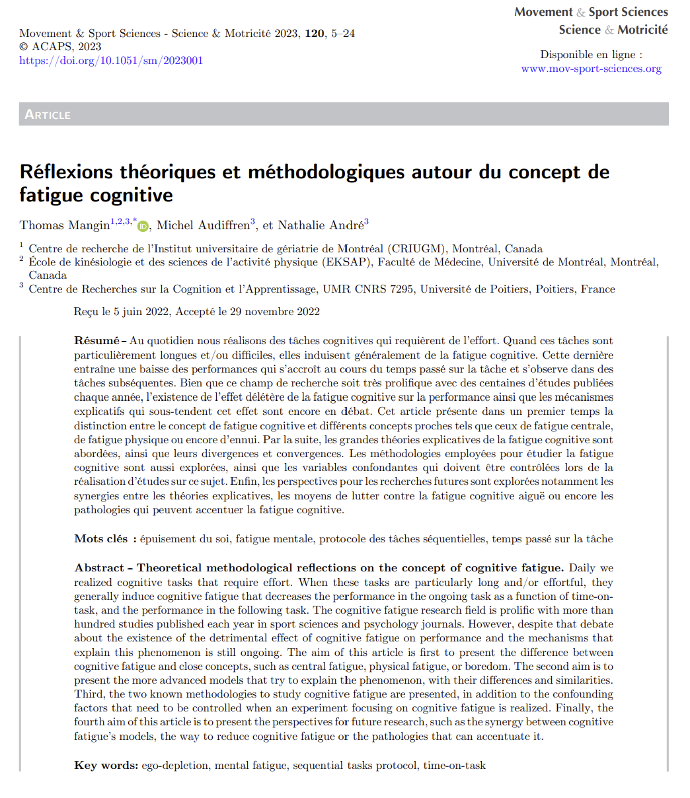

A Plausible Link Between Time-on-Task Effect and Sequential Task Effect
The
literature on mental fatigue is vast. Two main protocols are used to study it.
The first is the time-on-task protocol, where individuals perform a long task
requiring sustained attention. It is common to observe a decline in performance
with time on task (unless training has been done beforehand, which will
initially improve performance due to the training and then deteriorate due to
mental fatigue). The second is the sequential task protocol, where individuals
first perform a demanding task (or a control task that requires little or no
effort) and then a second equally demanding task. It is common to observe a
decline in performance in the second task when the first task was highly
demanding. This decline in performance is typically attributed to the presence
of mental fatigue.
In this study, we combined the two protocols and found a
positive but not very high correlation (r = .272) between performance on the
two tasks, indicating a common mechanism between the two declines in
performance. This mechanism could be mental fatigue. However, there is still a
large portion that is not shared between the two phenomena that remains to be
explained.
.
To cite this article: Mangin, T., Audiffren, M., Lorcery, A., Mirabelli, F., Benraiss, A., & André, N. (2022). A plausible link between the time-on-task effect and the sequential task effect. Frontiers in psychology , 13 , 998393.
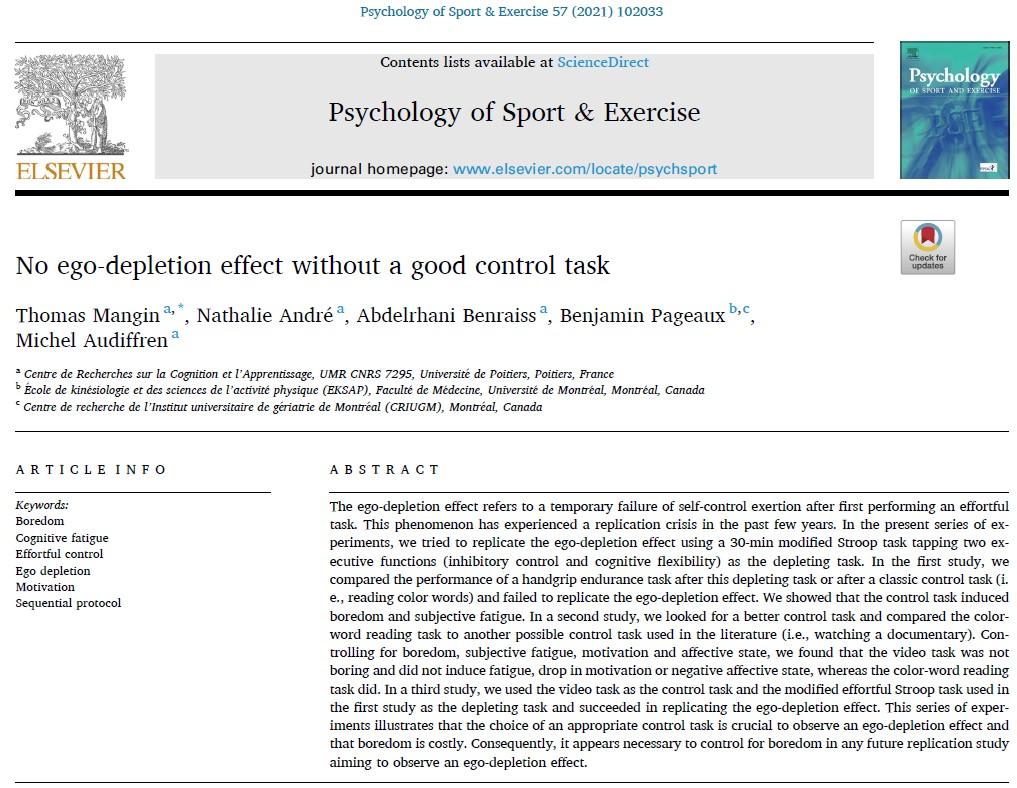
No Ego Depletion Without a Good Control Task
Ego-depletion is a phenomenon that has been widely studied for over 20 years. However, many studies have been unable to replicate the effect. In this article, we were interested in the necessary conditions for the emergence of the phenomenon. In a first experiment, we attempted to replicate the ego-depletion effect under the best conditions according to our knowledge (i.e., a long and difficult task that heavily taxed executive functions), but were unable to do so. However, we noticed that the control task used (which is regularly used in the literature) induced a lot of boredom in participants.
In a second experiment, we looked for a new control task that was as neutral as possible and could be used in the future, and compared it to the control task used in the first experiment.
In a third study, we used this new control task and were able to replicate the ego-depletion effect. We also noticed that the boredom felt in the exhausting task accounted for part of the variance in the ego-depletion effect.
To cite this article: Mangin, T., André, N., Benraiss, A., Pageaux, B., & Audiffren, M. (2021). No ego-depletion effect without a good control task. Psychology of Sport and Exercise , 57 , 102033.
Posters
Effects of Acute Muscle Pain and External Thermal Pain on a Fixed Perceived Effort Motor Task
Dans cette étude, les participants devaient serrer une poignée de serrage dynamométrique (handgrip) a un certain niveau d'effort perçu, sans feedback visuel. Nous avons mis en évidence qu'en présence de douleur, la force produite augmentée, alors que le participant garde le même niveau d'effort. Ceci va à l'encontre de nos hypothèses.
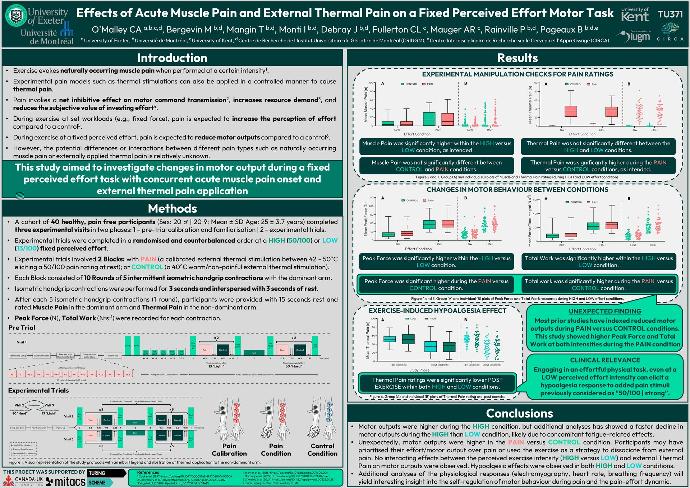
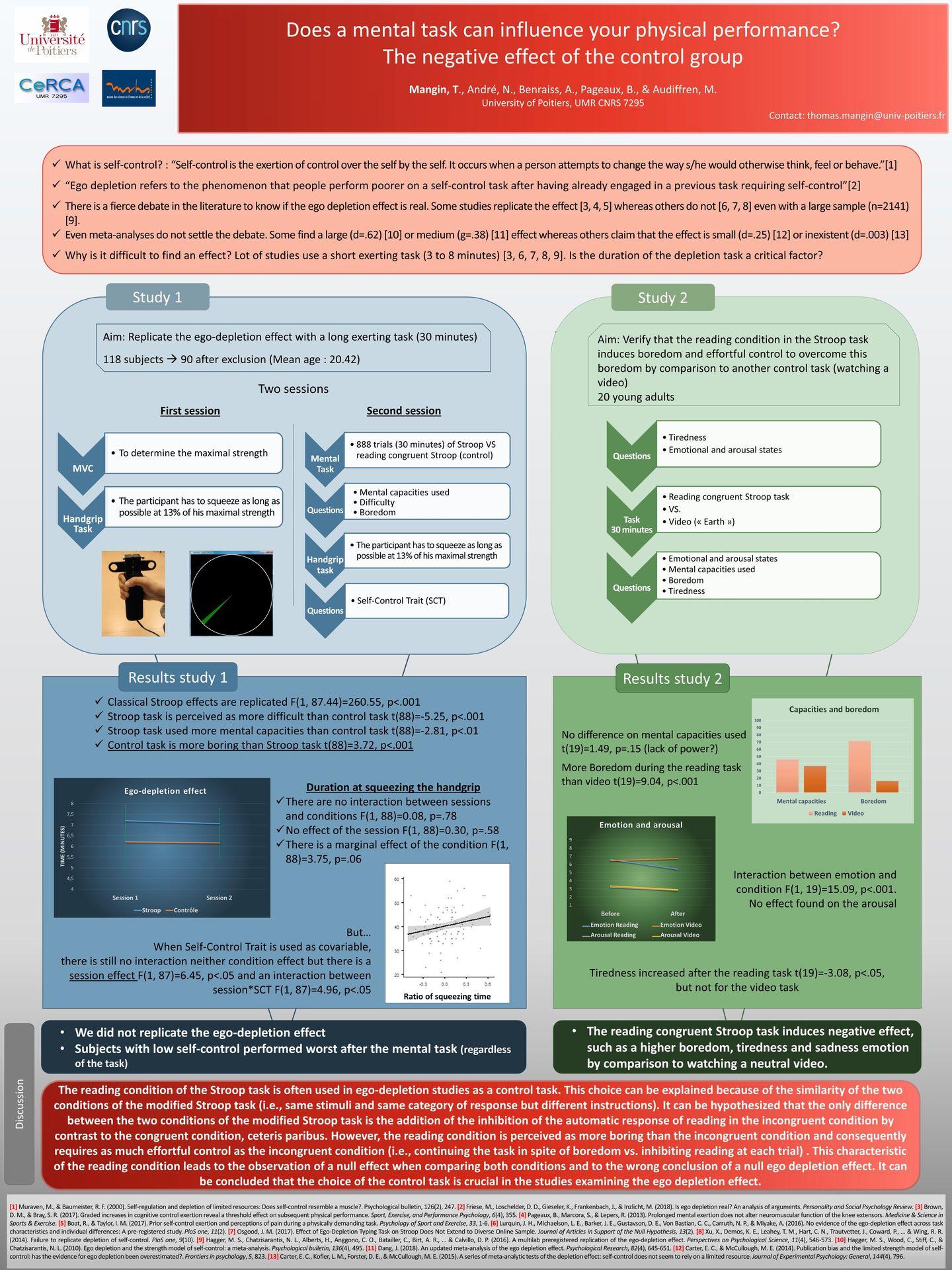
Does a mental task can influence your physical performance? The negative effect of the control condition.
This poster was a first presentation of the article
"Mangin et al., 2021. No Ego Depletion Without a Good Control Task"
at the European Congress of Sport Sciences.
To cite this poster: Mangin, T., André, N., Benraïss, A., Audiffren, M., (2019). Does a mental task can influence your physical performance? The negative effect of the control condition. Poster in European Congress of Sport Sciences. Prague University, Tcheque Republic, July, 3-6th.